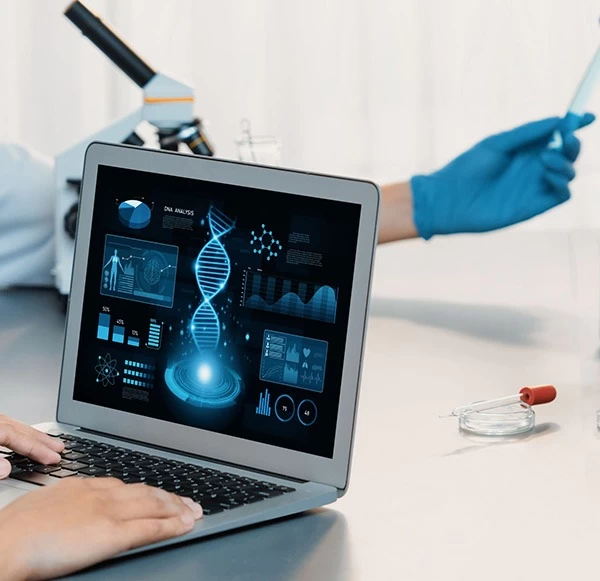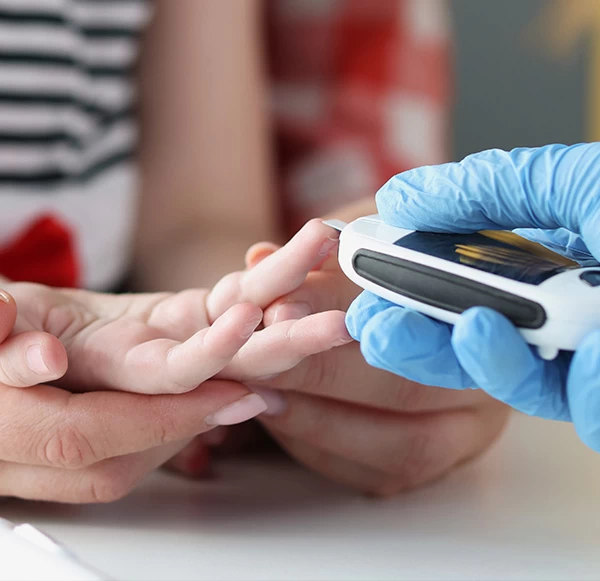- Email Us
-1743750443.webp)
Have you ever wondered how your healthcare provider can summarize your blood sugar level over time? That's when the HbA1c test is useful. All of your answer lies in the tiny molecule named glycated haemoglobin or simple HbA1c. Globally, diabetes is becoming a more serious health issue that affects millions of individuals of all ages. In 2021, 10.5% of adults aged 20 to 79 had diabetes, according to the International Diabetes Federation, and almost half of them were unaware that they had the disease. A comprehensive understanding of long-term glucose levels is essential for effective diabetic care, which extends beyond routine blood sugar checks. At that stage, the HbA1C test is conducted.
A vital indicator of how effectively your blood sugar has been controlled over time, the HbA1C test has emerged as a mainstay in the treatment of diabetes. You may take control of your health and successfully manage diabetes over the long term by being aware of the HbA1C test, regardless of whether you have diabetes, are at risk, or are just being proactive about your health. Through this blog, you will get a thorough understanding of how the HbA1c test works for diabetes in greater detail.
HbA1c, also known as the glycated haemoglobin test. When sugar travels through your bloodstream, it tends to bind to haemoglobin, a protein found in your red blood cells. In essence, it gives your doctor a glimpse into your blood sugar history in addition to your current condition. Its primary function is to measure the percentage of haemoglobin that contains glucose. It is crucial to keep in mind that an HbA1c test gives a more comprehensive picture of blood sugar over time than a fasting blood glucose test, which only analyses the patient's blood sugar level at one particular moment. People should evaluate their risk of developing complications from diabetes since a high HbA1c result is readily linked to a higher risk of complications from diabetes, such as kidney disease, nerve damage, stroke, and heart disease. Diabetes is also highly associated with age group; people under 45 years old or with a family history of diabetes should think about getting the test.
Since there is a clear correlation between diabetes and the HbA1c test, immediate testing is often recommended under evident indications like increased hunger, blurred vision, infections, slow healing of sores, sudden weight loss, and frequent urination, along with consulting a healthcare professional.
The HbA1c blood test is a simple procedure wherein a blood sample is extracted from the patient and sent to the laboratory to detect the amount of glucose present in blood, determining the range of diabetes. The HbA1C test doesn't require you to fast in beforehand, in contrast to fasting blood sugar tests. Most people find the test handy because it may be completed at any time of day.
The process undertaken at Mahajan Imaging and Labs are as follows:
A person is diagnosed with diabetes if their HbA1c result is 6.5% or above on two different tests. To further validate the diagnosis, doctors might also look at additional tests, such as an oral glucose tolerance test or a fasting blood sugar test.
A normal HbA1c reading of less than 5.7% indicates that blood sugar levels are under control. If your HbA1c is between 5.7% and 6.4%, it indicates prediabetes, a warning sign that you may develop diabetes if no lifestyle adjustments are undertaken. Diabetes is diagnosed when HbA1c levels are 6.5% or above. Maintaining a normal HbA1c level through a balanced diet, frequent exercise, and a healthy lifestyle is critical for long-term health and avoiding problems, including heart disease and nerve damage. While the HbA1C test is highly informative, it’s essential to discuss your results with a doctor. They can provide personalised insights, recommend treatment adjustments, and help create an effective management plan.
The HbA1c test is an effective technique for determining long-term blood sugar control and the risk of diabetes. Unlike daily blood sugar measurements, it provides a more complete picture of how effectively glucose levels have been managed over the previous few months. A healthy HbA1c level (less than 5.7%) helps to avoid consequences such as heart disease, nerve damage, and kidney failure. If your levels are high, simple lifestyle modifications, including eating a well-balanced diet and being active, can have a major impact. Regular testing and early treatment are critical for maintaining good health and lowering the risk of diabetes-related complications. The HbA1C test is highly informative, it’s essential to discuss your results with a doctor. They can provide personalised insights, recommend treatment adjustments, and help create an effective management plan.
Ans. Testing frequency for HbA1c varies, for individuals without diabetes a routine check-up is recommended in every 1 to 2 years, specifically for those with higher risk. While patients diagnosed with diabetes need testing in every 3 to 6 months, typically based on blood sugar control and treatment plAns.
Ans. A positive HbA1c result shows either diabetes or prediabetes, which means the levels are higher than 5.7%. Such result is an indication for further consultation and screening to be provided with an accurate treatment and medication.
Ans. A normal HbA1c reading of less than 5.7% indicates that blood sugar levels are under control.
Ans. Generally, fasting is not required for HbA1c test.




